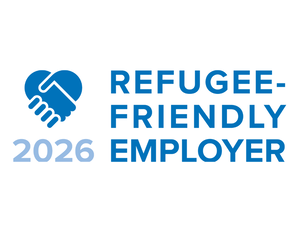Refugees generated a stunning 2.7 percent of Poland’s GDP in 2024, study shows
Refugees generated a stunning 2.7 percent of Poland’s GDP in 2024, study shows

Three years on, refugees from Ukraine continue to significantly contribute to the Polish economy. In 2024, their presence in Poland generated 2.7 percent of Poland’s Gross Domestic Product (GDP), according to the latest study “Analysis of the impact of refugees from Ukraine on the economy of Poland”, conducted by Deloitte for UNHCR.
Data confirms the quick labour market inclusion of refugees from Ukraine, with 69 percent of working-age Ukrainian refugees employed, only slightly below Polish citizens (75 percent). The study shows that Ukrainian refugees’ entry into the Polish labour market did not trigger adverse effects on the economy, such as a growth in unemployment or a decline in real wages; on the contrary, it contributed to an increase in employment for Poles, as well as improved productivity of Polish firms and employees. All evidence shows that Ukrainian refugees will continue having a positive economic impact while they remain in Poland, vastly outstripping the cost of any support they received.
“If you think refugees are a drain on the economy, think again. By allowing Ukrainian refugees to immediately work and start small businesses — after being forced to flee Russian aggression — Poland boosted its GDP by a whopping 2.7 percent in 2024,” said Kevin J. Allen, the Representative of UNHCR in Poland. “This is stunning, and clearly demonstrates that smart policy choices on the humanitarian and economic fronts are not mutually exclusive. Indeed, Poland has created a win-win scenario: catalysing fresh contributions to an increasingly strong Polish economy, and investing in the human capital of refugees who will help Ukraine build back better one day, when returns are safe.”
“The high number of Ukrainian refugees working in Poland clearly indicates that they have found their place on the Polish labour market. And at the same time, Poland’s economy has effectively adjusted to the supply of new employees and the competencies they brought with them,” says Deloitte’s expert Aleksander Laszek. “The number of employed individuals increased overall, and thanks to improved specialisation, so did the productivity of Polish firms and employees. In addition, refugees from Ukraine have a positive impact on consumption. Furthermore, benefits to the Polish economy can increase further if we address the identified challenges that refugees face to access the labour market.”
A high percentage of Ukrainian refugees perform work below their qualifications. For example, just one-third of refugees holding university diplomas hold positions that require such higher education. Certain regulated professions require Polish citizenship, so even with the adequate expertise and professional certification, refugees are limited in their career development or must requalify altogether. The report also analyses the impact of fluency in Polish on the earnings of refugees from Ukraine: Ukrainians who speak Polish fluently earn on average an additional PLN 700 monthly (approx. USD 180) compared to those who speak Polish at a beginner level. Addressing even half of the identified existing gaps could generate significant macroeconomic gains - at least PLN 6 billion annually (approx. USD 1.6 billion), based on conservative estimates considering only the direct gains for workers.
Poland hosts nearly one million refugees from Ukraine under Temporary Protection status, the second highest number in the EU. Most of them are women and children. While many have quickly settled, those in more vulnerable situations still need specific support. Economic inclusion and targeted assistance for the most vulnerable are essential to ensure their safety, protection and to find sustainable solutions.
About the Report
The report “Analysis of the impact of refugees from Ukraine on the economy of Poland” and the presented estimates are based on the model including the full impact on the economy and all public levies, i.e. taxes and contributions, which means that along with income taxes paid by Ukrainian refugees, the following items have been included: VAT, excise taxes, Social Insurance Contribution (ZUS), Health Insurance Contribution (NFZ), PIT and CIT paid by firms whose income increased owing to the employment or consumption of Ukrainian refugees.
Download the full report here
FOR MORE INFORMATION, PLEASE CONTACT:
UNHCR: Rafał Kostrzynski, [email protected] 788 22 40 10
Deloitte Polska: Daria Wappa-Hajdas, [email protected] 728 48 44 76








